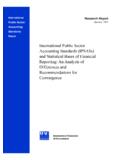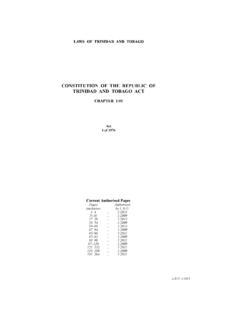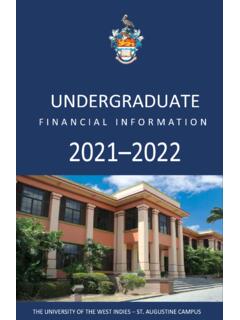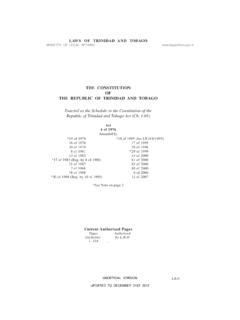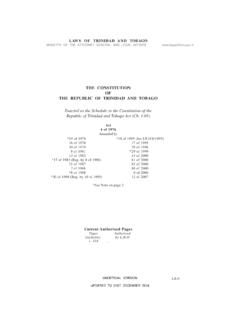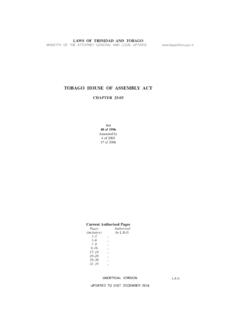Transcription of COMPTROLLER OF ACCOUNTS Ministry of Finance …
1 COMPTROLLER OF ACCOUNTS Ministry of Finance Government of the republic of trinidad tobago Accounting Manual Prepared by the Financial Management Branch, Treasury Division, Ministry of Finance i TABLE OF CONTENTS Page . iii 1. The Budgetary Process/Accountability 1 2. Structure and Functions of the Accounting 6 Request for Release of Funds and Application for 8 Request for the Release of Funds .. 8 Application for Credit on the Exchequer 10 General Process Flow of 13 Processing of Payments by the Sub Accounting 20 Payment 20 Schedule of 23 Vote 24 Processing of Payments by the Accounting Unit .. 26 Check 26 Cheque 30 Payroll Determination of Payroll Statutory and other 3.
2 Non-Cash Transactions Inter-departmental Overseas Mission Other Government and 4. 5. Preparation of Appropriation 6. Other Functions of the Accounting ii NIS Health Plan Other Statutory Insurance of Government iii INTRODUCTION (i) Purpose The development of this training manual is one of the initiatives undertaken by the Treasury Division in recognition of the important role that training has to play in the efficient operation of Financial Management Systems. Consequently, the manual has been developed to provide guidance to Ministries/Departments thereby equipping them with the necessary material to empower them in the performance of their accounting functions within the ambit of the laws, regulations, policies and guidelines, which have been issued over time.
3 This manual defines the legal framework within which Ministries/Departments operate and gives detailed procedures on the various functions of the Accounting Unit. It also defines the roles of major parties involved in the monitoring, implementation and control of government accounting systems. This manual is therefore intended to assist officers of Ministries and Departments in the better performance of their duties resulting in improved efficiency and enhanced productivity, while operating in an environment of accountability transparency and integrity. (ii) Legal Framework The legal basis for dealing with matters relating to revenue and expenditure by Government is found in the following documents:- The Constitution of the republic of trinidad and tobago Chapter 1:01; The Exchequer and Audit Act, Chapter 69:01; The Financial Regulations; The Financial Instructions 1965; These are supplemented from time to time by Circulars / Instructions issued by the Treasury on specific accounting matters.
4 (iii) Establishment of the Consolidated Fund Chapter 8 Section 112 (1) to (4) of The Constitution of the republic of trinidad and tobago provides for the establishment of the Consolidated Fund as follows: (1) All revenues or other moneys raised or received by trinidad and tobago , not being revenues or other moneys payable under this Constitution or any other law into some public fund established for a specific purpose shall, unless Parliament otherwise provides, be paid into and form one Consolidated Fund. iv (2) No moneys shall be withdrawn from the Consolidated Fund except to meet expenditure that is charged upon the Fund by this Constitution or any Act or where the issue of those moneys has been authorized by an Appropriation Act or an Act passed in pursuance of section 114 or in accordance with any other law. (3) No moneys shall be withdrawn from any public fund other than the Consolidated Fund unless the issue of those moneys has been authorized by an Act.
5 (4) No moneys shall be withdrawn from the Consolidated Fund or any other public Fund except in the manner prescribed. (iv) Role of the Minister of Finance (a) Authorization of Expenditure from the Consolidated Fund Chapter 8, Section 113 (1) and (2) of the Constitution states: (1) The Minister responsible for Finance causes to be prepared and laid before the House of Representatives before or not later than thirty days after the commencement of each financial year, estimates of the revenues and expenditure of trinidad and tobago for that year. (2) The heads of expenditure contained in the estimates, other than expenditure charged upon the Consolidated Fund by this Constitution or any Act, shall be included in a Bill, to be known as an Appropriation Bill, providing for the issue from the Consolidated Fund of the sums necessary to meet that expenditure and the appropriation of those sums for the purposes specified therein.
6 Further, if within any financial year it is found that the sum appropriated may be insufficient, or that there is need to expend on an item for which no appropriation was made, or that money may have been over-expended on an appropriated item, a supplementary estimate, showing the sum required or spent shall be laid before the House of Representatives and the heads of any such expenditure shall be included in a Supplementary Appropriation Bill. If the Appropriation Act in respect of any financial year does not come into operation by the beginning of that financial year, the Minister of Finance may authorize the withdrawal of moneys from the Consolidated Fund to meet the expenditure necessary to carry on the services of the Government, until the expiration of thirty (30) days from the beginning of that financial year of the coming into operation of the Act, whichever is the earlier.
7 Parliament may also provide for the establishment of a Contingencies Fund, and for authorizing the Minister of Finance to make advances from that Fund, if he is satisfied that there has arisen an urgent and unforeseen need for expenditure for which no other provision exists. v (b) Control and Management of Public Finance The Minster of Finance , under the Constitution and the provisions of the Exchequer and Audit Act Chapter 69:01 is responsible for the management of the Consolidated Fund and the supervision, control and direction of all matters relating to the financial affairs of the State which are not law assigned to any other Minister. (v) Role of the Auditor General The role of the Auditor General is defined under Chapter 8 Section 116 (1) to (6) of the Constitution of the republic of trinidad and tobago as follows: (1) There shall be an Auditor General for trinidad and tobago , whose office shall be a public office.
8 (2) The public ACCOUNTS of trinidad and tobago and of all officers, courts and authorities of trinidad and tobago shall be audited and reported on annually by the Auditor General, and for that purpose the Auditor General or any person authorized by him in that behalf shall have access to all books, records, returns and other documents relating to those ACCOUNTS . (3) The Auditor General is hereby empowered to carry out audits of the ACCOUNTS , balance sheets and other financial statements of all enterprises that are owned or controlled by or on behalf of the State. (4) The Auditor General shall submit his reports annually to the Speaker, the President of the Senate and the Minister of Finance . (5) The President of the Senate and the Speaker shall cause the report to be laid before the Senate and the House of Representatives, respectively, at the next sitting of the Senate and the House of Representatives after the receipt thereof, respectively.
9 (6) In the exercise of his functions under this Constitution the Auditor General shall not be subject to the direction or control of any other person or authority. (vi) Role of the Accounting Officer The Accounting Officer is defined in the Exchequer and Audit Act, Chapter 69:01 Section 2 Part I as: any person appointed by the Treasury and charged with the duty of accounting for any service in respect of which moneys have been appropriated by the Constitution or by Parliament, or any person to whom issues are made from the Exchequer Account. vi The responsibilities of the Accounting Officer are as follows: Ensure the proper conduct of the financial business of the State for which he is responsible Ensure that the funds entrusted to his care are properly safe-guarded Ensure that funds are applied only for the purposes intended by Parliament Ensure that expenditure does not exceed the sum authorized by Parliament The Accounting officer shall be answerable to the Public ACCOUNTS Committee for the formal regularity and propriety of ACCOUNTS of all the expenditure out of the votes for which he is responsible.
10 (vii) Role of the Internal Audit Section 13 (4) of the Financial Regulations to the Exchequer and Audit Act Chapter 69:01 provides for the establishment of an independent internal audit section as follows: (4) Each accounting unit shall have a check staff and an independent internal audit section. The overall objective of the internal audit is to assist Management in the effective discharge of its responsibilities by furnishing objective analyses, appraisals, recommendations and pertinent comments on the activities reviewed. The Internal Auditor must therefore be involved in any phase of activity in which he can be of service to management. The Internal Auditor is therefore expected to provide an effective examination or review of the accounting operations to ensure that the internal controls and accounting systems are operating efficiently and to report same to the Accounting Officer. The scope of work undertaken by the Internal Auditor is determined by his Accounting Officer to whom he is responsible.





